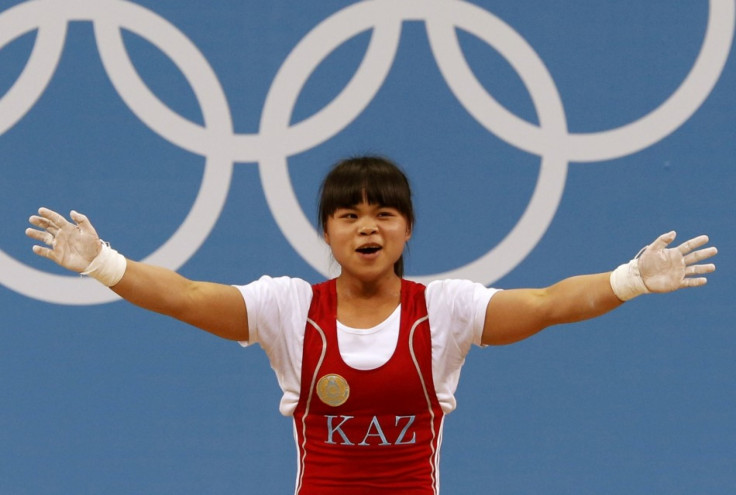Who’s That Girl? China Claims Kazakhstan’s Gold Medalist, Zulfiya Chinshanlo, For Itself

Zulfiya Chinshanlo, 19, took the top prize in the women's weightlifting competition at the 2012 London Summer Olympics. She'll bring her gold medal back home to Kazakhstan, but new reports are raising questions as to whether that medal belongs to China instead.
China's state-run news agency Xinhua has reported that Chinshanlo was born in the Chinese province of Hunan, and that her real name is Zhao Changling. Xinhua quotes a Chinese sports bureau official, who said that Changling lived in China up until 2008, when she was transferred to Kazakhstan for the express purpose of representing that country in weightlifting competitions.
But a Kazakh Olympic trainer denied Chinshanlo was Chinese, telling one EurasiaNet reporter that she was a member of Kazakhstan's Dungan ethnic group, from the Kazakh region of Bishkek.
Kazakhstan is a uniquely diverse country, and Dungans -- who have Chinese heritage -- make up only a small percentage of the population. There are more than a hundred different ethnicities in the country, according to the BBC, speaking everything from Kazakh to Russian to various dialects of Chinese.
Kazakh officials prize this diversity, especially since it has not led to conflicts or division. Kazakhstan is stable and relatively prosperous, with a wealth of natural resources, a diverse economy and a multi-party governmental system. And they are performing admirably in the 2012 Olympic Games -- Kazakhstan sent 114 athletes to London this year, and has so far won four gold medals.
China is currently in the lead, with 20 gold medals and counting. The country typically does very well in Olympic competitions -- and that's no accident. China values gold medals very highly, to the extent that many Olympic athletes have been trained in borderline-brutal exercise camps from very young ages. Chinese gold medal winners are proudly acclaimed by the state media, whereas silver and bronze winners are frequently ignored.
This 'gold fever' may explain China's insistence regarding Chinshanlo's true nationality, but the allegations are not impressing the people of Kazakhstan. That country, too, is prideful of its winning athletes. And even outside of the Olympics, Chinese influence has lately become a topic of contention.
Kazakhstan tends to ally with Russia more closely than with China, but has nonetheless been the recipient of increased Chinese investment over the past few years. Now, many Kazakhs are worrying that this involvement amounts to a kind of control, and that Kazakhstan will be unable to extricate itself from China's domineering influence.
Beijing has already begun bolstering Kazakhstan's energy sectors, according to NPR. There are also plans for a new railroad and an oil pipeline.
Saule Amirova, a 61-year-old woman from Almaty, a city in eastern Kazakhstan, sums up the popular unease with these developments.
"China is going to help us little but little," she said to NPR. "And then, they'll own our land."
Chinshanlo is alleged to have been born in that same city of Almaty, but she speaks Chinese as a first language and is reported to have family in Hunan province. It is likely that she has lived in China for most of her life, and China's claims to her identity could be partly legitimate.
But the fact remains Chinshanlo she was spotted by Kazakh scouts, trained by Kazakh coaches, and readied for the Olympic Games on Kazakh soil. Her gold medal victory for Kazakhstan is only a small example of how the Central Asian country, threatened by the growing power of its southeastern neighbor, is determined to retain a high degree of self-determination.
© Copyright IBTimes 2024. All rights reserved.






















